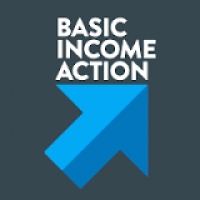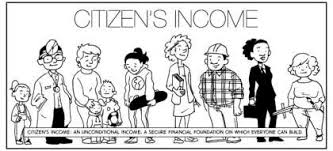Citizens Income
Sunday 31 January, 2016 Written by Australian Fabien Society
In August 2015, the Finnish government announced that they are investigating such an idea, in their proposed trial of a basic income. The Swiss government may also be obliged to have a referendum on the idea due to campaigners managing to gather over 100,000 supporters of a petition for such a vote.
Basic Income Action, a lobby group campaigning for the idea in America, describe the Basic Income as a ‘simple’ idea: ‘Set an amount – maybe $1,000 a month, or $800 or $1,500 a month – and have government provide that to every adult American. Everyone gets the same amount, ideally enough to guarantee that people can afford food, clothes, shelter, and other necessities. This is an income independent of what people earn at a job or through investments, and everyone gets it, no questions asked, either as a direct payment or combined into the tax system. It’s economic security for every American’.
Basic Income Action, a lobby group campaigning for the idea in America, describe the Basic Income as a ‘simple’ idea: ‘Set an amount – maybe $1,000 a month, or $800 or $1,500 a month – and have government provide that to every adult American. Everyone gets the same amount, ideally enough to guarantee that people can afford food, clothes, shelter, and other necessities. This is an income independent of what people earn at a job or through investments, and everyone gets it, no questions asked, either as a direct payment or combined into the tax system. It’s economic security for every American’.
There is much debate about the mechanics of such an idea, for instance what level wage should be guaranteed and whether the idea is affordable. There is also the question of how to raise the revenue to fund the measure; through a flat tax or a more equitable progressive tax system. Those against the idea seem concerned that a basic living wage would be a disincentive to work and would lead to a huge drop in workforce participation.
Advocates, however, argue that a minimum income would replace the costly burden of administering a social security system that requires citizens to apply for payments. They also reason that universal income stability would increase overall demand in the economy, ultimately improving the wealth of the nation.
Godfrey Moase, writing for Overland points out that a universal income gives people the space to be creative, innovative and enterprising because it ‘provides the material basis for a fuller development of human potential. Social enterprises, cooperatives and small businesses could be started without participants worrying where the next pay cheque would come from’.
As well as encouraging people to make brave decisions in their careers, a stable, guaranteed minimum income would have obvious benefits in reducing wealth inequality. Technology continues to disrupt and transform many industries, removing the need for low-skilled workers and causing long term unemployment. But a basic income is one strategy which could effectively end poverty caused through unemployment and could also provide unskilled workers with a wage to live on while they reskill and educated themselves for new careers.
The basic universal income is a radical, yet simple idea which is growing in popularity. Should trials, such as that proposed in Finland, be successful, universal basic income campaigners will no doubt be ramping up the debate and soon the idea may become a policy governments are forced, through democratic popularity, to investigate.

Basic Income Action: www.basicincomeaction.org
Sourse: The Australian Fabian Society
Leave a comment
Make sure you enter all the required information, indicated by an asterisk (*). HTML code is not allowed.
Join
FREE
Here










